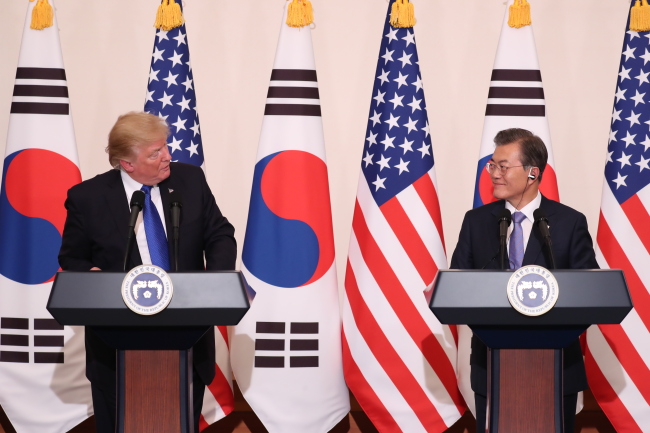Seoul, Washington seek ‘unprecedented’ cooperation to boost military capacity
By Choi He-sukPublished : Nov. 7, 2017 - 21:17
South Korea and the US will cooperate on “an unprecedented level” to strengthen Seoul’s military capabilities, President Moon Jae-in on Tuesday.
Speaking after a summit meeting with US President Donald Trump in Seoul, Moon said that the two countries will immediately begin talks regarding Seoul’s plans to purchase or develop cutting-edge military assets.
“We agreed to resolve North Korean nuclear issue peacefully, and to establish permanent peace on the Korean Peninsula,” Moon said at a joint press conference at Cheong Wa Dae, the presidential office.
Speaking after a summit meeting with US President Donald Trump in Seoul, Moon said that the two countries will immediately begin talks regarding Seoul’s plans to purchase or develop cutting-edge military assets.
“We agreed to resolve North Korean nuclear issue peacefully, and to establish permanent peace on the Korean Peninsula,” Moon said at a joint press conference at Cheong Wa Dae, the presidential office.

Saying that he and Trump renewed the resolve to work together on the issue, Moon said that the two countries agreed to strengthen the allied defense posture. Moon said that the two countries will “cooperate on an unprecedented level” in boosting South Korea’s defense capabilities, and to immediately begin talks regarding acquisition and development of new military equipment by South Korea. Moon also revealed that the agreement to lift restrictions on South Korea’s ballistic missile payload was finalized.
According to Cheong Wa Dae, the two sides adopted new missile guidelines that impose no limits on Korea’s missiles during the day’s summit talks.
A high-level Korean official later revealed that the weapons acquisition and development talks concern nuclear-powered submarines and surveillance assets.
“Nuclear-powered submarines and cutting-edge surveillance assets are included (in the talks). An agreement was reached in principle, but there are many elements that must be reviewed and discussed,” the official said on condition of anonymity.
Overall, Trump’s remarks concerning North Korea echoed those of Moon, and he urged the international community to work together in pressuring the regime.
“North Korea‘s sixth test of a nuclear device and its missile launches are a threat not only to the people of South Korea but to the people all across our globe,” Trump said.
“North Korea is a worldwide threat that requires worldwide action. We call on every responsible nation, including China and Russia, to demand that the North Korean regime end its nuclear weapons and its missile programs, and live in peace.”
Trump, however, warned that the US would bring its military into the equation if necessary.
“As we work together to resolve this problem using all of available tools short of military action, the US stands to prepare to defend itself and allies using full range of unmatched military capabilities if need be,” Trump said.
In response to a question on whether he viewed the situation to be progressing, Trump said that “it makes sense” for North Korea to denuclearize and that such a decision would be “for humanity all over the world.”
He said there is “certain movement,” but declined to elaborate on the possibility of engaging North Korea directly.
On the issue of bilateral trade, Trump reiterated his assessment of the Korea-US Free Trade Agreement, saying the two sides are looking to improve economic relations.
“I would like to thank President Moon for instructing his trade negotiators to work closely with us to quickly pursue a much better deal -- a deal that, frankly, has been quite unsuccessful and not very good for the United States,” Trump said.
Although Seoul had maintained that the trade pact was reciprocal in nature, the two sides are now working on modifying the deal.
Against much speculation from local pundits, the issue of South Korea’s share of US military costs incurred here was not given significant mention.
Ahead of Trump’s visit, local media and experts had raised the possibility that Trump could use his state visit to raise the concern. Korea’s presidential office also appeared wary of the possibility, with officials highlighting the significance of Camp Humphreys, the first stop on Trump’s South Korean itinerary, on a number of occasions.
Located in Pyeongtaek, Gyeonggi Province, the installation is the largest overseas base operated by the US. Building the base has incurred costs of about $10 billion, over 90 percent of which has been shouldered by Seoul.
Trump is to address the National Assembly on Wednesday, his second and last day in Seoul, and depart for China in the early afternoon, his third stop in a five-nation tour of Asia,
By Choi He-suk (cheesuk@heraldcorp.com)








![[KH Explains] Hyundai's full hybrid edge to pay off amid slow transition to pure EVs](http://res.heraldm.com/phpwas/restmb_idxmake.php?idx=644&simg=/content/image/2024/04/18/20240418050645_0.jpg&u=20240419100350)







![[From the Scene] Monks, Buddhists hail return of remains of Buddhas](http://res.heraldm.com/phpwas/restmb_idxmake.php?idx=652&simg=/content/image/2024/04/19/20240419050617_0.jpg&u=20240419175937)

![[KH Explains] Hyundai's full hybrid edge to pay off amid slow transition to pure EVs](http://res.heraldm.com/phpwas/restmb_idxmake.php?idx=652&simg=/content/image/2024/04/18/20240418050645_0.jpg&u=20240419100350)

![[Today’s K-pop] Illit drops debut single remix](http://res.heraldm.com/phpwas/restmb_idxmake.php?idx=642&simg=/content/image/2024/04/19/20240419050612_0.jpg&u=)